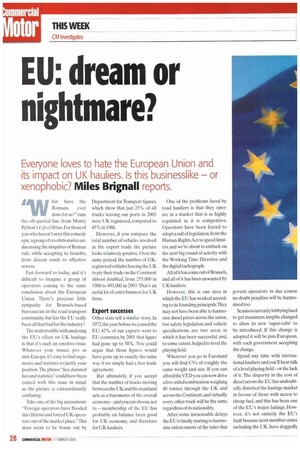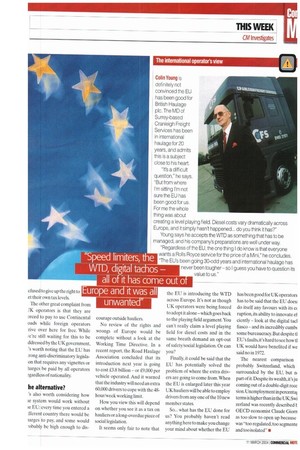EU: dream or nightmare?
Page 28

Page 29

If you've noticed an error in this article please click here to report it so we can fix it.
Everyone loves to hate the European Union and its impact on UK hauliers. Is this businesslike — or
xenophobic? Miles Brignall reports.
iW hat have the Romans ever done for us?" runs the oft-quoted line from Monty Python's Lift of Brian. For those of you who haven't seen this comedy epic, a group of revolutionaries are discussing the iniquities of Roman rule, while accepting its benefits, from decent roads to effective sewers.
Fast-forward to today, and it's difficult to imagine a group of operators coming to the same conclusion about the European Union. There's precious little sympathy for Brussels-based bureaucrats in the road transport community, but has the EU really been all that bad for the industry?
The main trouble with analysing the EU's effect on UK haulage is that it's such an emotive issue. Whatever your stance, pro or anti-Europe. it's easy to find arguments and statistics to justify your position.'The phrase "lies, damned lies and statistics" could have been coined with this issue in mind, as the picture is extraordinarily confusing.
Take one of the big accusations: "Foreign operators have flooded into Britain and forced UK operators out of the market place."This does seem to be borne out by Department for Transport figures, which show that just 25% of all trucks leaving our ports in 2003 were UK registered, compared to 45% in 1988.
However, if you compare the total number of vehicles involved in the export trade the picture looks relatively positive. Over the same period, the number of UKregistered vehicles leaving the UK to ply their trade on the Continent almost doubled, from 255,000 in 1988 to 493,000 in 2003. That's an awful lot of extra business for UK firrns.
Export successes
Other stats tell a similar story. In 1972.the year before we joined the EU, 42% of our exports went to EU countries; by 2001 that figure had gone up to 58%. You could argue that those figures would have gone up in exactly the same way if we simply had a free trade agreement.
But ultimately, if you accept that the number of trucks moving between the UK and the mainland acts as a barometer of the overall economy and you can choose not to membership of the EU has probably on balance been good for UK economy, and therefore for UK hauliers. One of the problems faced by road hauliers is that they operate in a market that is as highly regulated as it is competitive. Operators have been forced to adopt a raft of legislation, from the Human Rights Act to speed limiters, and we're about to embark on the next big round of activity with the Working Time Directive and the digital tachograph.
All of it has come out of Brussels, and all of it has been unwanted by UK hauliers.
However, this is one area in which the EU has worked according to its founding principals.They may not have been able to harmonise diesel prices across the union, but safety legislation and vehicle specifications are two areas in which it has been successful, and, to some extent, helped to level the playing field.
Wherever you go in Euroland you will find CVs of roughly the same weight and size. If you can afford the VED you can now drive a five-axled combination weighing 40 tonnes through the UK and across the Continent, and virtually every other truck will be the same regardless of its nationality.
After some inexcusable delays the EU is finally starting to harmonise enforcement of the rules that govern operators: in due course no doubt penalties will be harmonised too.
Scania is currently lobbying hard to get maximum lengths changed to allow its new 'super-cabs' to be introduced. If this change is adopted it will be pan-European. with each government accepting the change.
Spend any time with international hauliers and you'll hear talk of a level playing fieldor the lack of it. The disparity in the cost of diesel across the EU has undoubtedly distorted the haulage market in favour of those with access to cheap fuel, and this has been one of the EU's major failings. However, it's not entirely the EU's fault because most member states including the UK, have doggedly The other great complaint from JK operators is that they are arced to pay to use Continental oads while foreign operators rive over here for free. While te're still waiting for this to be ddressed by the UK government, 's worth noting that the EU has .rong anti-discriminatory legislaon that requires any vignettes or barges be paid by all operators gardless of nationality.
''S also worth considering how ie system would work without ie EU: every time you entered a .fferent country there would be iarges to pay, and some would -obably be high enough to dis No review of the rights and wrongs of Europe would be complete without a look at the Working Time Directive. In a recent report, the Road Haulage Association concluded that its introduction next year is going to cost £3.8 billion or £9,000 per vehicle operated. And it warned that the industry will need an extra 60,000 drivers to cope with the 48hour/week working limit.
How you view this will depend on whether you see it as a tax on hauliers or a long-overdue piece of social legislation.
It seems only fair to note that the EU is introducing the WTD across Europe. It's not as though UK operators were being forced to adopt it alone which goes back to the playing field argument. You can't really claim a level playing field for diesel costs and in the same breath demand an opt-out of safety/social legislation. Or can you?
Finally, it could be said that the EU has potentially solved the problem of where the extra drivers are going to come from. When the EU is enlarged later this year UK hauliers will be able to employ drivers from any one of the 10 new member states.
So... what has the EU done for us? You probably haven't read anything here to make you change your mind about whether the EU has been good for UK operators has to be said that the EU doesi do itself any favours with its c( ruption, its ability to innovate el ciently look at the digital tad fiasco and its incredibly cumb( some bureaucracy. But despite tl EU's faults, it's hard to see how ti UK would have benefited if we said no in 1972.
The nearest comparison probably Switzerland, which surrounded by the EU, but ni part of it.Despite its wealth, it's ju coming out of a double-digit rece sion. Unemployment in percentai terms is higher than in the UK; Swi zerland was recently described t OECD economist Claude Giorn as too slow to open up because was "too regulated, too segmente and too isolated" •
































































































































































































